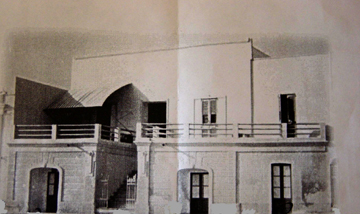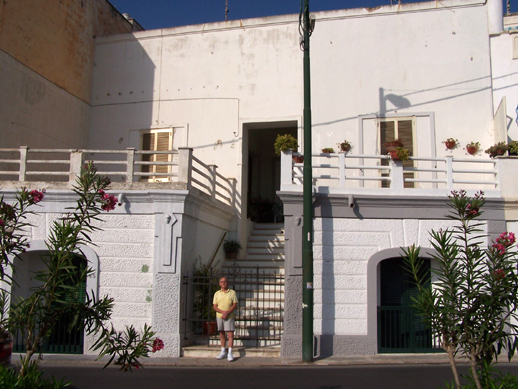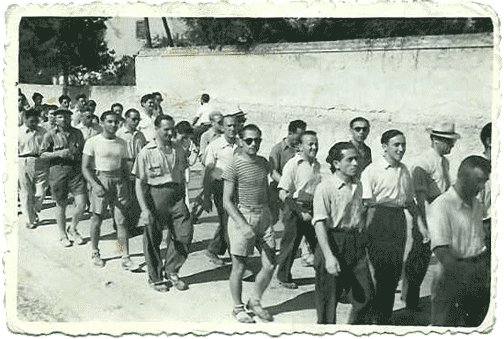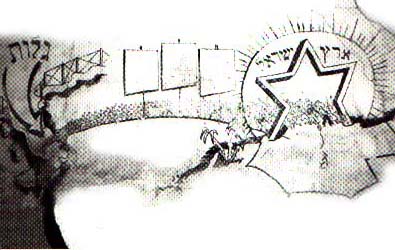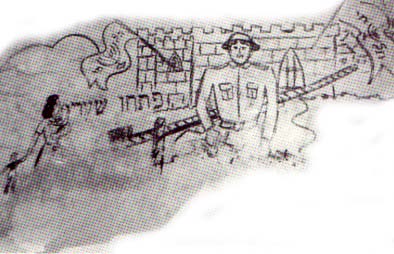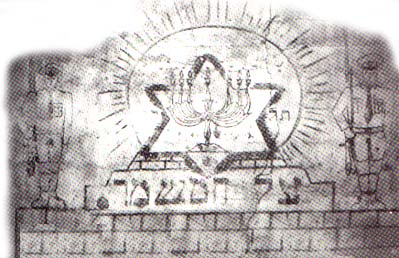Santa Maria al Bagno (or formerly Bagni di Santa
Maria)
Displaced Persons Camp in Italy
A displaced persons camp or DP camp is a temporary facility for displaced persons. The term is mainly used for camps established after World War II in Germany, Austria, and Italy, primarily for refugees from Eastern Europe and for the former inmates of the Nazi German concentration camps. Two years after the end of World War II in Europe, some 850,000 people lived in DP camps across Europe, among them Armenians, Poles, Latvians, Lithuanians, Estonians, Yugoslavs, Jews, Greeks, Russians, Ukrainians and Czechoslovaks.[1]
In recent times, camps have existed in many parts of the world for groups of displaced people including for refugees in the Darfur region of Sudan, and for Palestinians in Lebanon and Jordan, as well as for Afghan refugees in Pakistan. Such camps are now generally known as refugee camps. (For more, see: Wikipedia - https://en.wikipedia.org)
20, May 2010,
Dear Olga – My parents met
in Santa Maria di Bagni. My mother was a volunteer of the Jewish relief units
from London and my father was liberated from Abensee, a
concentration camp in the Austerians Alps, a sub camp of Mathausen.
He arrived to Mathausen after a death march from Auschwitz. He was originally
from east Poland (today ) Belarus and spent months 27 in concentration .camps
My father's name was Shemuel Mordechai Rubinstein and my mother's name was
Hannah Ettinghausen (they called her in the camp Hannale.
Here is a link to my father's memories which include Santa Maria Part
IV.
Alll the best, Chaim Ribinstein rubinst@bezeqint.net or Chaimtr@gmail.com
Hi all,
On July 19, 2005, in
Santa Maria al Bagno (Nardo`), Lecce, Italy, at the conference center of
the "Quattro Colonne" (Lungomare Alfonso
Lamarmora) a conference organized by the Nardo`s City Hall will take place
to officially inform the public about the concession (on January 2005) of
a golden medal to the Nardo`s community by the President of the Italian Republic,
Carlo Azeglio Ciampi. The reason for this important aknowledgement is the fact that the local
community hosted from 1944 to 1948 the displaced people arriving
from the freed territories of Germany/Austria/Poland under the flags of the
US/UK Governments and UNRRA. Some former guests of the DP Camp of Santa Maria al Bagno as well as some
personalities are expected to participate. To further verify through the web of any further useful information:
the Comune di Nardo at http://www.comune.nardo.le.it. Please note that Massimiliano Boccardo, active info-center in Santa Maria al
Bagno could perhaps provide some useful information. His email address: info@inprimis.net. The end of July in Salento is notoriously very hot and dry, so be sure to find
good and confortable accomodations as well as any necessary information
in advance.Very truly yours, Pierluigi Congedo,
London
pierluigi.congedo@kcl.ac.uk Hi
Olga, I'm so grateful for your site, I thought I was going crazy trying to find Santa Maria Di Bagni until I saw it on your site. My father is 79 years old, a holocaust survivor from Poland who lost his entire family and then lived in Italy at the DP camp from 1945 - 1950. I am writing his biography and planning on visiting the site this August 2004. The problem is I can't find it anywhere on the map. Could you please help! Any information or contacts that you know of would be incredible. I promise when I return I will write you all about it and send you photographs for the site. Many thanks, Helen Blatt Phone 212.229.2487 / Fax 212.647.1868
9/29/04 Hello Helen (and Olga)
I have just read your lines regarding the DP Camp of Santa Maria al
Bagno (Nardo,
Lecce). My grandparents owned an old house in Santa Maria al Bagno that
was seized by the US / UK governments between 1944 and 1947 in order to
provide a location to the DP Persons who arrived in Santa Maria pursuant
to a UNRRA project. In Sept. 2004, my parents and I guested for a week
Mr. Ottfried Weisz, from Bedford, Mass., 74, a former guest of the DP camp,
with his wife Gennie. It was very emotional for him to be back there after
60 years, to be received by the vice-Mayor of the town, to speak on regional
television and to be interviewed by a local newspaper, and to be guest
of an high school for a touching conference.
Please do not hesitate to inform your father that with a group of friends, we are trying to collect any oral/written witnesess of that period and that we would be grateful to him if he could send us any written/recorded memory of the period he spent in that village.
I am glad if you can cooperate with my attempt to save any witnesess of that time over there, I do believe that we have a duty to do it, since at least we have understood what happened! Here the picture I have of our house (1940):
"DP Camp nr. 34" (1944-1947) - the correct name is Santa Maria al Bagno (borough of Nardo, province of Lecce, region: Puglia, Italy). It can be also found as Bagni di Santa Maria, but it is less frequent. I thank you for your admirable activity, that provides an unreplaceable source of information and contacts. Pierluigi Congedo, Rome Italy vienneseotto@juno.com
7 July 2009, Dear Olga,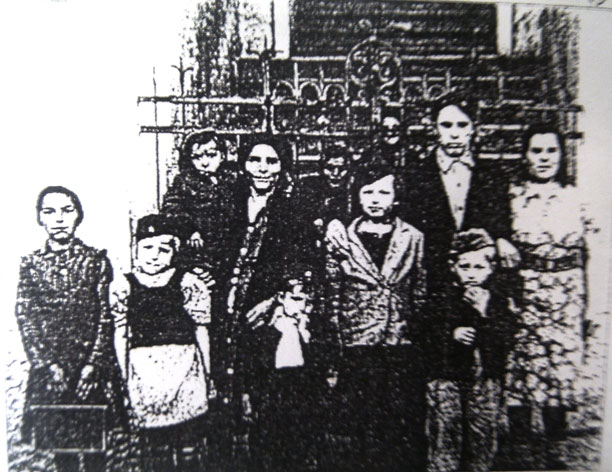
Please
find here attached a photo I recently found in a local newspaper. It
actually reproduces some DPs already gathered in Santa Maria al Bagno (Nardò,
LE) in 1944, when the picture was taken just in front and on the staircase
of our family house in Santa Maria. Looking at the clothes and the time
(1944) it is possible that they were Yugoslavs liberated by local concentration
camps (Nazi or even Italian) by Tito's partisans. The fact that they
were gathered in Santa Maria as DP persons (i.e. that the did not want
to stay in their original country) may be explained with their political
views (opponents of Communism, Royalists?). The house still belongs to
our family and contains some traces of the passage of the many Jews that
in those years passed throughout (1944-48). Kind regards. Pierluigi - Pierluigi.Congedo@ulb.ac.be
Photo left submitted by Elie Lewinger.
10/23/04 Dear Olga,
We found your site and we are interested in getting and giving information about displaced people after WW2. My parents, Polish Jews from Cracovie were lucky to survive Auschwitz, Bergen Belsen and Mathausen. They decided to go to Palestine. At the end of 1945, they stayed in a refugee camp called either Santa Maria di Bagni (where I have the address and maybe the photo I have correponds to it) or Santa Maria di Leuca. In 1946 my parents were waiting for a ship, but their plans were changed and they left Italy to go to France in 1948, where I was raised. My parents are dead and they left me some photos of that period without saying who the people were and we never met them afterwards. If anyone wants to contact me, it will be with pleasure.Thank you in advance. Elie Lewinger / France1/10/05 Hi Olga I've seen your site...it's very interesting. Don't forget the past is the priority to make better our world! I'm in Santa Maria al Bagno and I work in the tourism sector. In 2004, in Santa Maria al Bagno is born an association and a little museum about the DP Camp of Santa Maria al Bagno. If someone wants some information to reach S. Maria al Bagno or wants to come here, my email is info@inprimis.net. I have also a site http://www.inprimis.net there you can find some B&B or different solutions to stay here.
I send you the photos of three murales made in Santa Maria al Bagno by Zivi Miller, a holocaust survivor from Rumania. I think they are a very important memories about the dp camp of S. Maria al Bagno. These three murales are still here (...they are almost decadent) and we are tring to save them! But it's not simple because the local administration doesn't believe that they can have a touristic interesting!! So there is not money to save them!!!! It's a very sad story!!! Look at the photos and tell me what do you think!
Thank you. Massimiliano Boccardo Inprimis sas - servizi al territorio
3/25/07 Dear
Olga,
My father, Henry P. Gerber, worked for UNRRA at Santa Maria al Bagno from early January 1945 until November 1945. He was Activities Director.
In this position his main work was in establishing and running shops
of various types; such carpentry, sewing, etc. During his time in
Italy he wrote home almost daily (sometimes two letters in a day) and
included many details of his work and travels in the immediate region
to obtain equipment, and supplies for the camp. He was 58 years old
at the time and his usual job was that of Professor of Industrial
Arts at a Teachers College here in Aberdeen,South Dakota.
I recently came into possession of these when one of my older brothers died. I am now 80 and in very good health but am concerned about the future of these letters, many of which were 3 and 4 pages long (handwritten). My plan is to transcribe them (which will be a significant task) so they can be easily read by my father's grandchildren (35), great grandchildren and great great gandchildren, plus others who may have use, or interest in them.
My mother and father had a family of 8 children and during 1945 five of us were in the armed forces scattered over the globe, with only my younger brother at home, one older brother who was 4-F due to a heart condition was working in a naval shell-loading plant in Hastings, NE and my only sister was in Texas where here husband was an engineer in an aircraft factory.
I am wondering if you have any suggestions that would be helpful in making something useful of these letters. We also have some photos from the camps. Some of these are of personnel running the camp and some are of refugees. My father was most affected by the many children (orphans) in the camp. I would be most grateful for any suggestions or help.
Sincerely,Bernard C. Gerber, MD gerbbc@nvc.net
8/11/07 Dear
Olga,
My name is Yarden Pinto from Israel. I'm in a group of 4 students and a teacher
and we're doing a research about DC camps in south Italy- like Santa Maria al
Bagno. We found your wonderful website and we wanted to thank you and also to
ask your help with information about those camps and people who went through
those camps. If you know where to find information about conventions to build
those camps or newspapers about those camps, it will be very helpful. Again,
thank you very much, Yarden Pinto from Israel. yaluden@gmail.com
Oct 5, 2017
Looking for a person from DP camp in Santa Maria di Leuca, Italy
Dear Olga,
May be you can help or assist me. I’m looking for informations about a luxembourgish person, i.o. Mister HILGER NIKOLAS called JOS (maybe also Hilger Nicolas or Hilge Nikolas). He was born 3.12.1914 in Luxembourg. As I was told he was with the yougoslav Tito partisans in Macedonia until february 1945. Then he is said to be flown to Bari and transported to Santa Maria di Leuca. It is mentioned that he made a daily journey along the coast from the « faro » for about 5 km and he was living on his own in a house in SML. From SML he is said to be transported to Naples from where he joined Luxembourg after the end of the hostilities in Luxembourg.
I thank you very much for you kind help.
Gast Kobs, Luxembourg kobsgast@pt.lu
Italian search engine: http://search.virgilio.it/
https://en.wikipedia.org/wiki/Bagnoli
Guide to the Records of the Displaced Person Camps and Centers in Italy, 1945-1955
http://digifindingaids.cjh.org
